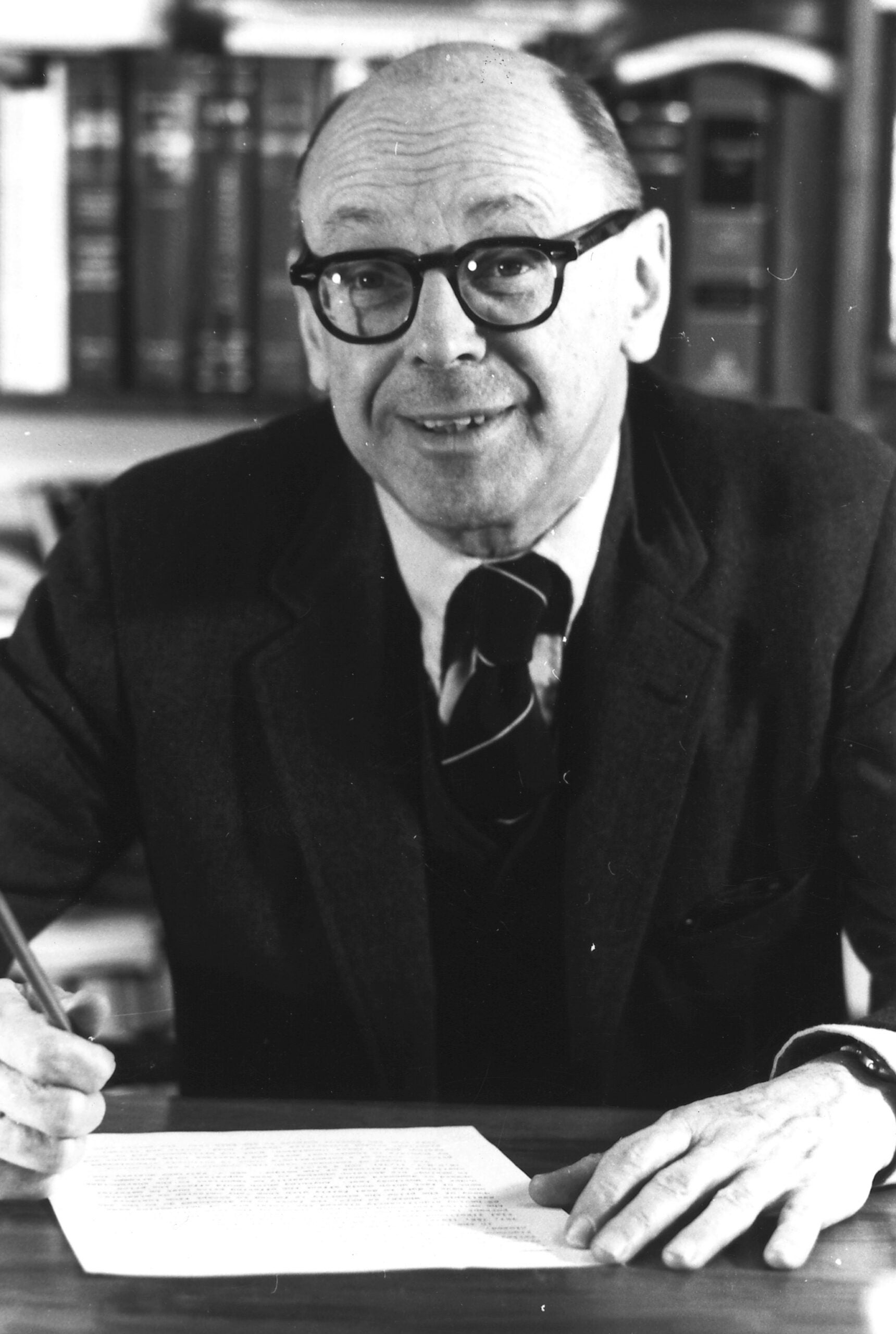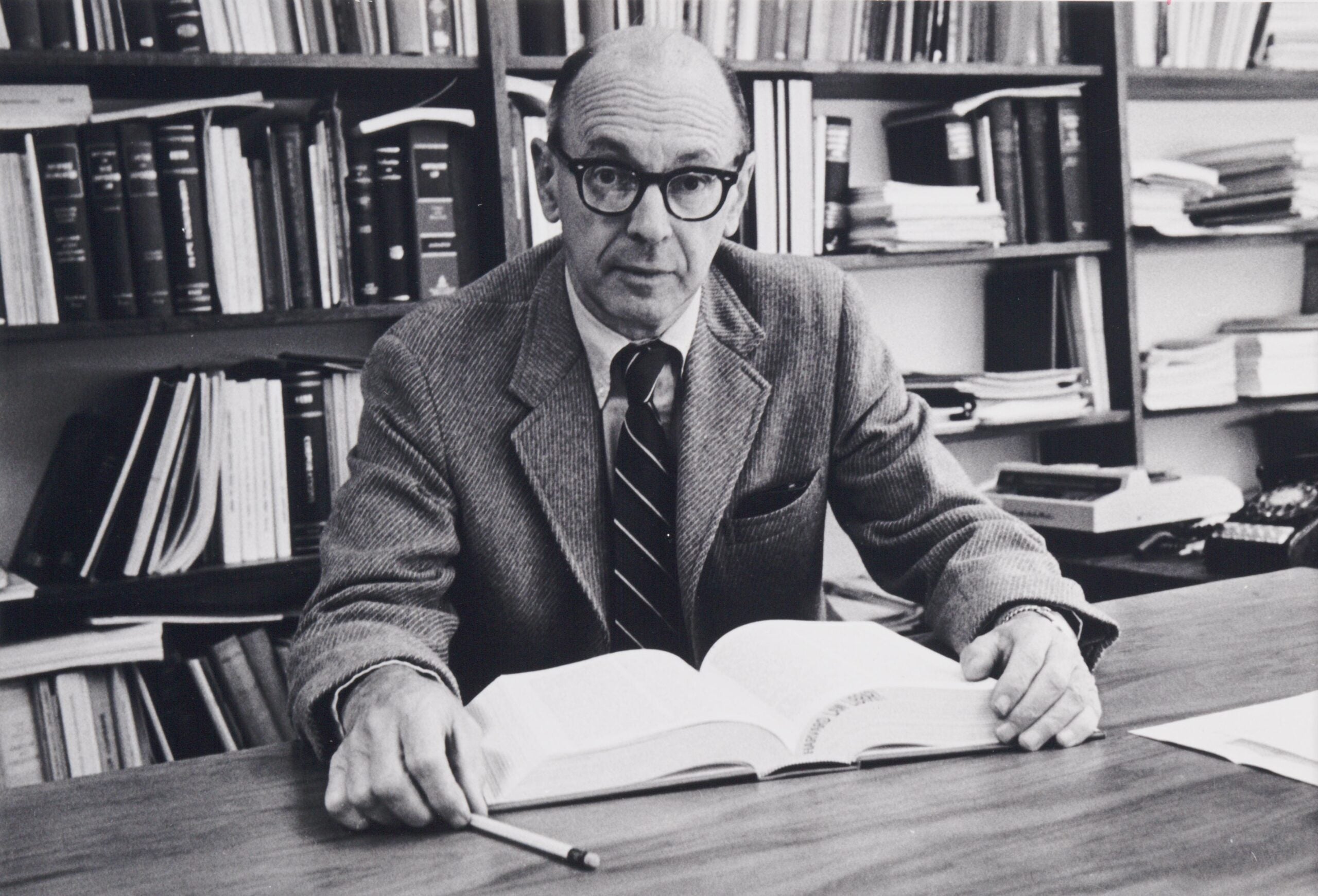Victor Brudney, a giant in the field of corporate law and a major figure at Harvard Law School from the early 1970s through the 1990s, died April 14, in Cambridge, at age 98.
Harvard Law School Dean Martha Minow said: “Victor Brudney was a towering and inspiring teacher and scholar and his searching inquiry into fundamental issues of fairness, equality, and freedom in the worlds of corporate law and finance benefited generations of students and colleagues. Personally, I am so grateful for his wisdom, warmth, humor, and friendship over many years. Harvard Law School will always treasure Victor Brudney for his work, as an example of a great life in the law, and as a truly remarkable human being.”
Brudney joined the Harvard Law School faculty in 1970 as a visiting professor. He served as a professor of law from 1971 to 1988, and later as the Robert B. and Candice J. Haas Professor in Corporate Finance Law, Emeritus. Early in his career he taught at Rutgers Law, and later he was an emeritus law professor at Boston College (1994 to 2007). He was also a visiting law professor at Yale, Stanford, Columbia, and Fordham.
Brudney had an enormous following of former students, many of whom are now in law practice, government work, or academia.
Former Harvard Law School Dean Robert C. Clark ’72, a former student of Brudney, said: “Victor Brudney had a perfect blend of wit, wisdom, and heart. As a professor, he combined an unusually deep practical knowledge of how corporate transactions typically unfold, together with a firm grasp of evolving corporate finance theory and research. And he was an incredibly helpful mentor to many students, including me, who aspired to become legal academics. He played an essential role in my life, and I shall miss him greatly.”
Another former student, Harvard Law School Professor and Director of the Program on Corporate Goverance Lucian Bebchuk LL.M. ’80 S.J.D. ’84, credits Brudney with sparking his interest in corporate law and supervising his S.J.D. dissertation on corporate takeovers. “He was responsible for my interest in corporate law, provided important guidance as I entered the field, and served—and still serves—as inspiration for my work,” said Bebchuk. “I feel very fortunate to have had the opportunity to benefit from his mentorship, wisdom, warmth, and friendship.”

Brudney was a corporate law pioneer who foresaw problems and highlighted issues that occupy the field to this date. Three decades before the Supreme Court’s 2010 decision in Citizens United v. FEC, Brudney anticipated the significance of corporate law rules for regulating corporate speech. In a 1981 Yale Law Review article, “Business Corporations and Stockholders’ Rights Under the First Amendment,” Brudney wrote, “law is needed―to allocate the corporation‘s capacity to become a speaker.”
Brudney proposed treating the question of corporate expenditures for political campaigns as a matter of corporation law, requiring shareholder approval of spending in political campaigns.
With Allen Ferrell ’95, Harvard Law School’s Harvey Greenfield Professor of Securities Law, Brudney co-wrote a 2002 article in the Chicago Law Review, “Corporate Charitable Giving,” that offered a comprehensive analysis of corporate governance rules that could address corporate charitable contributions.
Brudney was born in the Bronx and earned a B.A. and M.S. from the City College of New York in 1937 and an LL.B. from Columbia University in 1940, where he served on the law review.
He briefly served as a law clerk for Associate Justice James F. Byrnes of the U.S. Supreme Court, before accepting a clerkship with Justice Wiley B. Rutledge. Rutledge, who served less than seven years on the Court, hired a total of six law clerks, including Brudney and the future Supreme Court Justice John Paul Stevens.
The first of Rutledge’s hires, Brudney became the benchmark against whom every clerk thereafter was measured, according to John Ferren ’62, senior judge, District of Columbia Court of Appeals and author of “Salt of the Earth, Conscience of the Court: The Story of Justice Wiley Rutledge.” Ferren wrote that Rutledge valued the intellectual firepower from his assertive law clerk, and he once said: “I never had a clerk who fought with me so hard when we differed as Vic did. More than once I threw him out of my office only to have him come back and reopen the argument.”
Brudney served as a New Deal lawyer at the Securities and Exchange Commission and the Department of Justice. During WWII, he served as a top aide to Fred Vinson at the Office of Economic Stabilization, an executive agency charged with fighting inflation. He had a 20-year career in private practice in New York City before joining the faculty at Rutgers Law School and later Harvard Law.
He was the co-author with the late Marvin Chirelstein of “Cases and Materials on Corporate Finance” and the author of numerous articles in leading law reviews and peer-reviewed journals.
In 1982, Brudney was elected a member of the American Academy of Arts & Sciences. HLS’s Program on Corporate Governance established a writing prize in his honor for the best student paper on a topic related to corporate governance.
Brudney was married for 54 years to the late Juliet Fleischl Brudney, a former director of the Boston YWCA and a columnist for nearly 20 years with the Boston Globe. He is survived by four children: James, a law professor at Fordham University; Karen, an assistant clinical professor of medicine at Columbia University and expert advisor to the Centers for Disease Control; Daniel, a philosophy professor at the University of Chicago; and Thomas, an attorney with the National Labor Relations Board, in Washington DC, as well as nine grandchildren.
